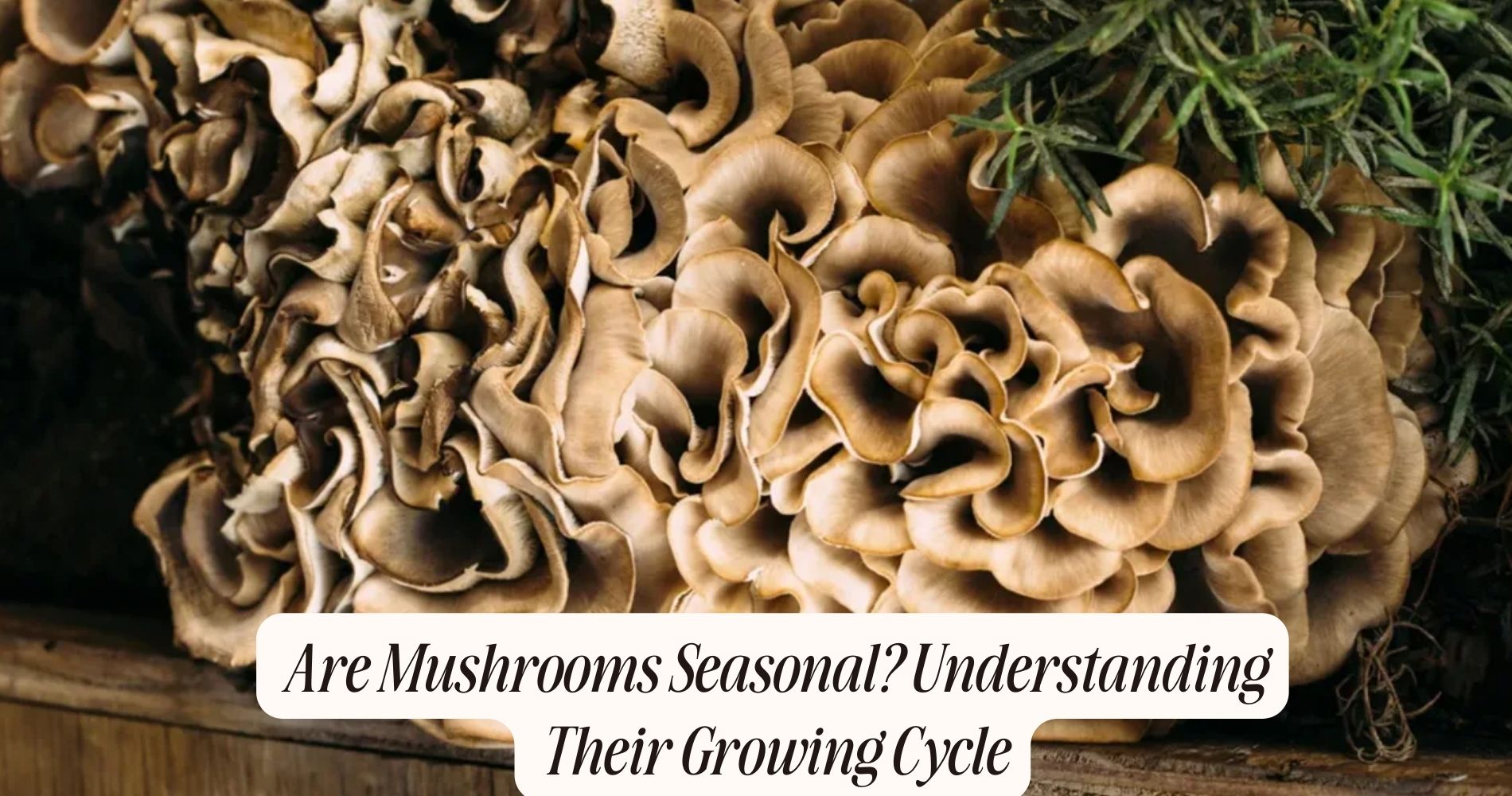
What Does Lion's Mane Taste Like?
What does lions mane taste like? Lion's Mane mushroom offers you a distinctive culinary experience with its unique flavor that combines mild sweetness, earthiness, and a seafood-like taste reminiscent of shellfish. When raw, it delivers a soft, spongy texture, while cooking techniques like sautéing or grilling enhance its umami essence, creating a delectable, crispy exterior with a juicy interior. Its fibrous, tender layers provide an exceptional mouthfeel, different from other mushrooms.
This gourmet ingredient can elevate soups, broths, and pasta dishes with its sophisticated complexity. As you explore further, you'll uncover more about its unparalleled taste and nutritional benefits.
Overview of Lion's Mane
Lion's Mane, a distinctive and highly revered medicinal mushroom, has garnered attention for its unique neuroprotective properties and culinary versatility. When you investigate its health benefits, you'll find an impressive array of bioactive compounds.
These compounds, such as hericenones and erinacines, have been shown to stimulate nerve growth factor (NGF) synthesis, which is essential for the maintenance and regeneration of neurons. As a result, Lion's Mane is often cited for its potential to improve cognitive functions, alleviate symptoms of neurodegenerative diseases, and promote overall mental clarity.
Beyond its medicinal allure, Lion's Mane has an intriguing culinary history. It's not just a modern health fad; this mushroom has graced the tables of East Asian cultures for centuries.

Revered in traditional Chinese medicine, it was considered a delicacy among Buddhist monks, who valued its meat-like texture that made it an excellent vegetarian substitute. Its savory, slightly sweet flavor profile has made it a versatile ingredient in various dishes, bridging the gap between health and gastronomy.
Culinary Uses
When incorporating Lion's Mane into your culinary repertoire, you'll discover that its unique texture and subtle, umami-rich flavor make it an exceptional addition to a wide range of dishes. This mushroom's fibrous, almost meaty consistency lends itself beautifully to gourmet presentations, allowing you to elevate simple dishes into sophisticated culinary experiences.
One of the most exciting aspects of cooking with Lion's Mane is the opportunity for flavor exploration. You can sauté it in butter and garlic to enhance its natural umami qualities, or marinate it in soy sauce and ginger for a more Asian-inspired dish. Its ability to absorb flavors makes it a versatile ingredient that can adapt to various culinary traditions.
In gourmet presentations, you'll find Lion's Mane often replacing meat in vegetarian and vegan recipes, thanks to its satisfying texture. Imagine a Lion's Mane 'crab' cake, where the mushroom's fibrous strands mimic the texture of crab meat, or a creamy Lion's Mane risotto that highlights its earthy undertones.
Whether you're experimenting with new recipes or incorporating it into your favorite dishes, Lion's Mane offers a plethora of opportunities for culinary creativity and flavor exploration.
Raw Taste
When you sample Lion's Mane raw, you'll encounter a mild, sea-like flavor that hints at its oceanic origins.
The texture, soft and spongy, provides an unexpected yet intriguing mouthfeel, contrasting with more conventional mushrooms.
This unique combination makes it a fascinating subject for culinary experimentation.
Mild Sea-like Flavor
Possessing a delicate, sea-like flavor, raw Lion's Mane mushroom offers a culinary experience reminiscent of shellfish, subtly blending earthiness with an oceanic undertone. When you first taste it, you might be struck by the nuanced similarities to seafood, particularly scallops or crab. This mushroom doesn't overwhelm the palate but instead provides a gentle, refined taste that invites closer inspection.
The flavor nuances are intriguing. There's a mild brininess that evokes images of the sea, yet it's not as pronounced as actual seafood. Instead, it complements a natural earthiness, creating a unique profile that stands out in the fungal kingdom. The subtle sea-like flavor can be particularly appreciated when the mushroom is consumed raw, as cooking can sometimes mask these delicate notes.

Critically, the balance between the mushroom's inherent earthiness and its marine-like qualities makes Lion's Mane a versatile ingredient. You can use it to add an unexpected twist to dishes that traditionally feature seafood or simply enjoy it raw to fully appreciate its complexity. This mushroom's ability to merge terrestrial and aquatic flavors is what makes it a sought-after delicacy for those with a discerning palate.
Soft, Spongy Texture
In its raw state, Lion's Mane mushroom presents a soft, spongy texture that almost melts in your mouth, offering a unique tactile experience that complements its delicate flavor profile. This texture is quite unlike the more fibrous or crunchy feel of other mushrooms, making Lion's Mane a standout ingredient that invites various cooking techniques. When you bite into a raw piece, you'll notice that its sponginess is reminiscent of biting into a soft sponge cake, providing immediate satisfaction before dissolving smoothly.
Texture comparison with other fungi reveals that Lion's Mane is markedly different from the chewy shiitake or the firm button mushroom. Its raw form almost begs to be explored further, whether through sautéing, grilling, or even using it as a meat substitute in vegetarian dishes. Such a versatile texture allows it to absorb flavors and spices exceptionally well, making it a canvas for culinary creativity.
Critically examining this mushroom's raw texture, it's evident that its unique softness and sponginess aren't just culinary quirks but integral characteristics that influence how you might approach its preparation and cooking techniques.
These textural properties are what make Lion's Mane a culinary treasure.
Cooked Flavor Profile
Sautéed to perfection, Lion's Mane mushrooms reveal a complex, seafood-like flavor profile that's both earthy and subtly sweet. When you employ various cooking techniques such as grilling, roasting, or pan-searing, the mushroom's inherent flavors become more pronounced. The mild sweetness and gentle earthiness can be amplified by the addition of flavor enhancements like garlic, shallots, or a splash of white wine.
In the kitchen, your choice of cooking method greatly impacts the final taste. For instance, pan-searing Lion's Mane with a bit of olive oil and butter creates a golden-brown crust that locks in its umami essence, reminiscent of crab or lobster. Roasting it with herbs and a touch of lemon zest elevates its natural sweetness, while also adding a zesty brightness. Grilling imparts a smoky nuance, further enriching its savory qualities.
Seasoning plays a pivotal role as well. A dash of soy sauce or a sprinkle of sea salt can bring out the mushroom's latent flavors, making each bite a gourmet experience. Through thoughtful preparation and creative enhancements, you can transform Lion's Mane into a culinary masterpiece, showcasing its unique, seafood-like flavor profile.
Texture Characteristics
While the flavor profile of Lion's Mane mushrooms captivates with its seafood-like nuances, their texture offers an equally intriguing dimension, boasting a delicate yet meaty consistency that sets them apart from other fungi.
When you bite into a piece of Lion's Mane, you'll notice its fibrous and tender layers, which create a unique mouthfeel. This textural complexity can elevate your sensory experience, making each bite a journey through subtle variations.

You'll find that the texture variations of Lion's Mane mushrooms are particularly pronounced when they're cooked. They can range from slightly chewy to almost sponge-like, depending on the method of preparation.
Sauté them, and you'll get a crisp exterior with a juicy, succulent interior. Roast them, and they develop a denser, more concentrated texture that pairs wonderfully with robust flavors.
Your sensory experience with Lion's Mane mushrooms isn't just about taste; it's about the interplay of textures that dance on your palate. Each preparation method reveals a new facet of these fascinating fungi, ensuring that you'll never tire of their multifaceted allure.
Whether you're an adventurous foodie or a culinary purist, the texture of Lion's Mane mushrooms offers endless exploration.
Comparison to Other Mushrooms
When juxtaposed with other mushrooms, Lion's Mane stands out for its unique blend of seafood-like flavors and complex textures, distinguishing it from the earthier profiles of varieties like shiitake or portobello.
To begin with, Lion's Mane boasts a fibrous texture that's often compared to crab or lobster meat. This texture comparison reveals its versatility, making it an excellent meat substitute in vegetarian and vegan dishes.
In terms of flavor similarities, Lion's Mane doesn't possess the woody, umami notes typical of shiitake mushrooms. Instead, you'll find a subtle, slightly sweet, and savory flavor that's more reminiscent of seafood than terrestrial fungi. This makes it a fascinating ingredient, offering a nuanced palate experience that's both delicate and robust.
Portobello mushrooms, on the other hand, offer a denser, meatier texture and a pronounced earthy flavor that contrasts sharply with Lion's Mane's more refined taste profile.
While portobellos are often used as a meat substitute as well, their flavor and texture are markedly different, providing a more straightforward, hearty experience.
Pairing Suggestions
When considering pairing suggestions for Lion's Mane, you'll find its unique texture and subtle umami flavor make it ideal for enhancing savory dishes.
It elevates the depth of soups and broths, imparting a sophisticated complexity.
Additionally, this mushroom shines when incorporated into pasta, complementing various sauces with its rich, meaty essence.
Complementary Savory Dishes
To elevate the unique umami flavor of Lion's Mane mushrooms, consider pairing them with complementary savory dishes like roasted garlic and herb-infused polenta. The earthy notes of the mushroom find a harmonious partner in the creamy, fragrant polenta, whose subtlety allows the Lion's Mane's complexity to shine. Additionally, sautéed vegetables can add a delightful textural contrast and further amplify the umami profile.
When preparing sautéed vegetables, think of using ingredients that enhance the mushroom's natural taste without overwhelming it. A medley of bell peppers, zucchini, and shallots, lightly seasoned with herbs, can create a balanced and vibrant dish. The slight sweetness of bell peppers complements the mushroom's depth, while zucchini and shallots add nuances of flavor and crunch.

Savory sauces can also play a pivotal role in accentuating Lion's Mane. Consider a rich, velvety mushroom sauce or a tangy balsamic reduction. These sauces can enhance the umami characteristics of the Lion's Mane while adding layers of complexity.
A light drizzle of truffle oil can also elevate the dish, imparting a luxurious aroma that complements the mushrooms' natural richness. By choosing the right pairings, you'll create a harmonious and sophisticated culinary experience.
Enhancing Soups' Flavors
Elevating soups with the complex umami of Lion's Mane mushrooms requires thoughtful pairing to enrich the broth and create a symphony of flavors.
Start with a robust soup base, such as chicken, vegetable, or beef broth, to form a solid foundation. The mushrooms' subtle seafood-like nuances can harmonize beautifully with these bases, adding depth without overwhelming the palate.
Consider incorporating flavor enhancers like soy sauce or miso paste. These umami-rich elements amplify the mushroom's inherent flavors, making each spoonful more delightful.
Fresh herbs such as thyme, rosemary, or parsley also complement the Lion's Mane, enhancing its earthiness while introducing aromatic complexity.
For a touch of sophistication, add a splash of white wine or a squeeze of lemon juice. These acid components balance the umami and prevent the soup from becoming too heavy.
Don't forget garlic and onions; their natural sweetness and aromatic qualities serve as perfect companions, rounding out the flavor profile.
When you incorporate Lion's Mane mushrooms into your soup, you're not just adding an ingredient; you're transforming the dish into an elevated culinary experience.
With the right soup bases and flavor enhancers, your soup becomes an exquisite blend of tastes and aromas.
Perfect With Pasta
Lion's Mane mushrooms, with their unique texture and umami richness, can transform even the simplest pasta dishes into gourmet experiences. Their meaty consistency and complex flavor profile make them a versatile addition to various pasta recipes. When paired with al dente spaghetti or fettuccine, Lion's Mane mushrooms can enhance the dish's depth, creating a symphony of flavors that tantalize the palate.
To achieve prime flavor combinations, consider integrating these mushrooms with creamy sauces such as Alfredo or carbonara. The mushrooms' umami notes will meld seamlessly with the rich, velvety textures of these sauces, elevating the dish to new culinary heights. Alternatively, a light garlic and olive oil sauce can highlight the mushroom's natural flavors without overwhelming them. Add a sprinkle of fresh parsley and a dash of lemon zest for a touch of brightness.
For a more adventurous twist, incorporate Lion's Mane into a spicy arrabbiata or a savory puttanesca. The mushrooms' robust flavor can stand up to bold ingredients like capers, olives, and chili flakes, creating a harmonious and satisfying pasta experience.
Nutritional Benefits
Often celebrated for its unique flavor, Lion's Mane also offers a remarkable array of nutritional benefits that contribute to overall well-being. The mushroom's impressive nutritional profile includes a rich concentration of essential vitamins, minerals, and antioxidants. High in protein and fiber, it supports digestive health and helps maintain muscle mass. Furthermore, it's packed with bioactive compounds like hericenones and erinacines, which are known for their neuroprotective properties.
The health benefits of Lion's Mane extend to cognitive function and mental health. Studies suggest that regular consumption may enhance memory, improve focus, and even alleviate symptoms of anxiety and depression. This is largely attributed to its ability to stimulate the production of nerve growth factor (NGF), a protein vital for the growth and maintenance of neurons.

Additionally, Lion's Mane supports immune function due to its polysaccharide content, which can boost the activity of the immune system. Its anti-inflammatory properties further enhance its role in promoting overall health.
When you incorporate Lion's Mane into your diet, you're not just enjoying a culinary delight; you're also investing in long-term health benefits that can improve your quality of life.
Discover the Benefits of SUPER MUSHROOM GUMMIES
As you explore the unique flavor of lion's mane mushrooms, consider the convenient wellness boost offered by SUPER MUSHROOM GUMMIES from Well Gummies. These tasty gummies combine 10 functional mushrooms, including lion's mane, to support your brain function and energize your body naturally. They are vegan, flavored with fresh wild berries, and crafted to enhance your focus, energy, and immune health without any jitters or crash. Enjoy these gummies daily to maintain a balanced body and a clear mind, as effortlessly as enjoying your favorite candy.
Frequently Asked Questions
Is Lion's Mane Safe for People With Mushroom Allergies?
If you have mushroom allergies, exercise caution with Lion's Mane. Despite its unique properties, it remains a fungus and could trigger allergic reactions. Consult with a healthcare professional before incorporating it into your diet.
Can Lion's Mane Be Consumed by Pregnant or Breastfeeding Women?
You should consult your healthcare provider before consuming Lion's Mane during pregnancy or breastfeeding. While it offers nutritional benefits, appropriate dosage recommendations are essential to guarantee safety for both mother and child.
What Are the Potential Side Effects of Consuming Lion's Mane?
When consuming lion's mane, you might encounter digestive issues such as bloating or nausea. Additionally, allergic reactions, although rare, can occur. It's prudent to monitor any adverse effects and consult with a healthcare professional.
How Long Does It Take for Lion's Mane to Grow?
To grow lion's mane, you'll need ideal growth conditions and proper cultivation methods. Typically, it takes about two to four weeks, depending on temperature, humidity, and substrate quality. Precision in these factors accelerates the growth process.
Are There Any Medicinal Uses for Lion's Mane Beyond Its Culinary Applications?
You'll find that lion's mane offers substantial cognitive benefits, enhancing memory and focus. Additionally, it bolsters immune support, aiding in overall health. These medicinal uses make it a valuable addition beyond its culinary applications.
Conclusion
In conclusion, Lion's Mane offers a unique culinary experience, blending a seafood-like flavor with a succulent texture.
When cooked, its taste evolves into a delightful combination of crab and lobster, making it a versatile addition to various dishes. Pairing it with complementary flavors enhances its natural umami.
Rich in nutrients, this mushroom not only elevates your meals but also contributes to a balanced diet.
Don't hesitate to explore its potential in your kitchen.




